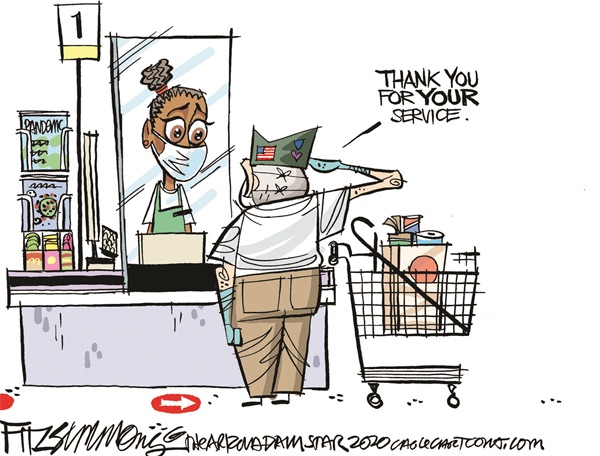Pandemic Exposes Race and Class Divide
Deeper Pattern of Inequity Affects Deaths Among Black and Brown People

One quarantine night, my partner and I stayed home — no surprise there — and we set up for game night with a pantry full of snacks. We competed to build a wooden tower without knocking it over, and as the suspense grew with the tower’s height, so did our understanding that it wasn’t going to be one move that knocked it down. Every decision we made contributed to its wobbly or stable structure. The tumble and clash of wooden pieces was, as much as I hate to admit it, both of our faults.
Our society is interconnected, just like that wooden tower. The culmination of decisions, actions, or lack thereof impact the stability of our communities, states, and country. It is easy to note the last action that caused the tower to tumble. It’s also time we recognized all the actions that led us to this moment. It’s time we recognize how our wobbly, crooked nature has been decades in the making. It’s the structural racism and inequity that is deeply engrained in our country’s history that is destabilizing the moment.
Today, the novel coronavirus, which took over our lives two months ago, has already killed more than14,000 individuals in New York City. From shelter-in-place orders, to empty grocery stores, to trillion-dollar stimulus packages — our communities have seen it all, and speaking as a recently displaced (remote) Columbia University student, I think I can attest we are all feeling as if everything, our hospitals, our economy, and our world, could fall at any moment.
While research is still developing, evidence is already showing how COVID-19 is more dramatically impacting black and brown communities around the country. In fact, in communities like the Bronx, made up of high numbers of people of color, the likelihood of dying from the virus is more than double. In cities like Chicago, black residents make up 70 percent of all COVID-19 related deaths. Quickly, we are seeing how the COVID-19 pandemic in the United States is one of race and class, and one that has been developing, piece by piece, for centuries. Finally, we are seeing what the result of ignoring minority health disparities means for our society as a whole.
COVID-19 highlights the United States’ dangerous pattern of discrimination and oppression — from environmental injustices, to redlining, to medical racial biases — that built a society to innately support whiteness and disadvantage people of color. The inequality, present for centuries, finally received national attention when data showed comorbidities are driving this pandemic. It isn’t that one community is simply more likely to get high blood pressure or asthma, but rather the institutional inequities that created unjust housing conditions, toxic working conditions, and inadequate access to healthy food. These actions built the inequality in the pandemic’s effect in the U.S. It continues as black and brown zip codes are seeing the highest shortages of supplies.
The virus preys on our weakest pieces, the pieces left out of our game plan. Sending economic resources to black and brown communities supports them today; it won’t change the core that keeps us standing.
It’s time we recognize that to change the stability of our present day, we have to put minority health needs at the forefront. We need to impact the pieces we’ve ignored. We need to support our black and brown communities.
We are interconnected — everyone and everything we do. Queens is New York City’s COVID-19 epicenter, one of the most ethnically diverse places in the world. It is made up of working-class essential workers, including 58 percent of all transportation jobs in the city. For some neighborhoods in the borough, however, poverty rates can reach up to 22 percent. As we develop strategies and deploy resources to fight this virus, we must recognize the deep-rooted systems that have contributed to communities’ lack of stability.
It won’t be COVID-19 that knocks us down. It will be the economic and social costs of losing so many people of color who are essential parts of our economy. It’s time we recognize we need each other. Without one piece, we are not one.



